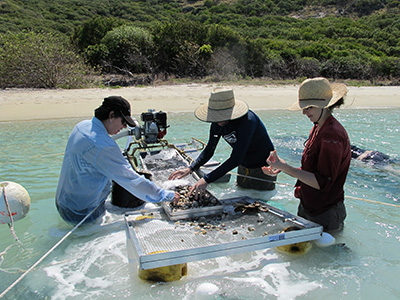Media Releases
Archaeologist seeks climate lessons in our deep past

The first human occupation of island archipelagoes in Queensland’s far north is the focus of a study by a James Cook University archaeological researcher.
Pictured above: JCU Staff Clair Davey and Sean Ulm and JCU honours student Samantha Aird excavating in the intertidal zone of Lizard Island (Photograph: Ian McNiven).
Associate Professor Sean Ulm is a Cairns-based Australian Research Council (ARC) Future Fellow in JCU’s College of Arts, Society and Education.
His current work, funded by the ARC, is investigating the impacts of humans arriving on the islands.
“I am studying how people colonised islands in the Gulf of Carpentaria thousands of years ago, and how they transformed those isolated landscapes after they arrived,” Associate Professor Ulm said.
“We can then use these findings as an analogue of what might have happened on the mainland more generally.
“The islands act like a case study, which can then be extrapolated to the rest of the continent.”
Associate Professor Ulm said he has been undertaking collaborative research with Aboriginal communities in the Gulf for over a decade.
“What we’re trying to understand is how people have engaged with their environments,” he said.
“Over time, people have had to change their behaviour in the face of dramatic climate change.
“People in the past lived through dramatic sea-level changes, not unlike what we are facing today, so by understanding how it impacted in the past, we can make better decisions about how we respond to climate change in the future.”
Associate Professor Ulm was recently elected as a Fellow of the prestigious Australian Academy of the Humanities.
He is the first to receive a Fellowship while based at JCU. There are three others from the Humanities disciplines currently located at JCU who are Fellows of the Academy: Professor Robert Dixon, Professor Michael Ackland and Distinguished Professor Alexandra Aikhenvald.
One of Australia’s four learned academies, the Academy aims to advance knowledge and the pursuit of excellence in the humanities for the benefit of the nation.
Fellowship to the Academy of the Humanities is a significant achievement for top-career humanities academics – a parallel is a scientist becoming a Fellow of the Academy of Science.
The Academy described Associate Professor Ulm as:
“A specialist at the forefront of human-environmental studies in Aboriginal archaeology, particularly from coastal contexts in northern Australia and the Pacific, Ulm’s work is credited for recasting the nature of coastal occupation models from the Holocene period by integrating accurate climate models with forensic analysis of coastal sites. He is highly regarded for his coordination of multidisciplinary expertise in the investigation of the prehistoric coastal record.”
Associate Professor Ulm said he was thrilled with the prestigious accolade.
“I am very honoured and humbled by this award, and for my work to be recognised by my colleagues in this way,” he said.
Link to photos: http://bit.ly/1Nu2YSI
For interviews; Associate Professor Sean Ulm: 0417 792 191
Caroline Kaurila, JCU Media Liaison, 0437 028 175